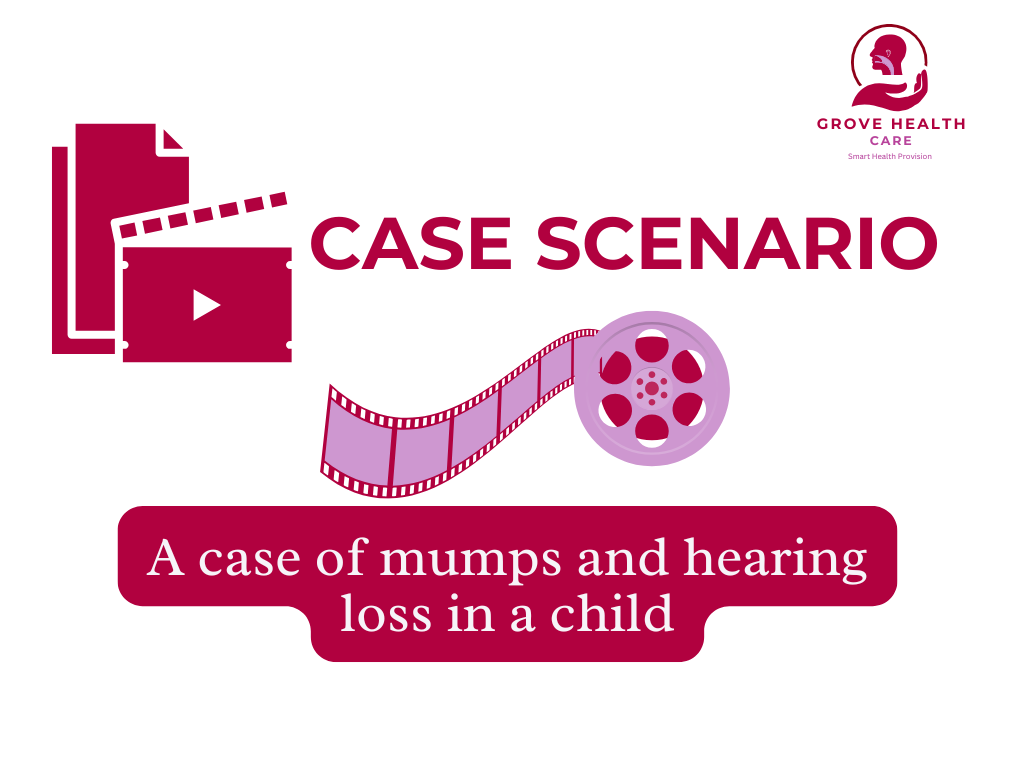An 8- year old boy presented with a history of mumps, which happened 6 months prior but resolved completely. Around the same time caretakers noticed progressive declined in his response to his name and instructions. This was attributed to spiritual forces, so was not sent for medical care.
By the time child presented to a general physician and was referred to an ENT specialist, he could not hear at all but speech was normal.
Physical examination showed normal ear, nose and throat except inability to perceive sound.
OtoAcoustic emission (OAE) done – failed in both ears, indicating damage to outer hair-cells.
Tympanometry showed Type A tympanogram in both ears ( normal middle ear pressures).
Pure Tone Audiometry ( PTA) showed bilateral profound hearing loss.
A trial of BTE hearing aid showed remarkable response to pure tones presented to both ears.
Parents were counselled to procure Hearing Aid and also to plan for possible cochlear implant.
How does mump virus cause hearing loss in children?
Mumps virus can cause hearing loss in children through several mechanisms:
Direct Viral Invasion
- Viral replication: The mumps virus replicates in the inner ear, specifically in the cochlea and vestibular apparatus.
- Damage to hair cells: The virus damages the hair cells in the cochlea, leading to permanent hearing loss.
Inflammation and Immune Response
- Inflammation: The immune response to the mumps virus causes inflammation in the inner ear, leading to damage to the delicate structures.
- Cytokine release: The release of cytokines, such as tumor necrosis factor-alpha (TNF-alpha), contributes to the inflammation and damage.
Pathological Changes
- Cochlear damage: The mumps virus can cause direct damage to the cochlea, leading to permanent hearing loss.
- Vestibular damage: The virus can also damage the vestibular apparatus, leading to balance problems and vertigo.
Risk Factors
-
Age
Children under the age of 5 are more susceptible to mumps-related hearing loss.
-
Severity of infection
More severe mumps infections increase the risk of hearing loss.
-
Delayed treatment
Delayed treatment or lack of treatment can increase the risk of hearing loss.
Prevention
-
Vaccination
The measles, mumps, and rubella (MMR) vaccine is highly effective in preventing mumps and related complications, including hearing loss.
-
Early treatment
Prompt medical attention and treatment can help reduce the risk of hearing loss.
Share Post On:
Recent Posts
-
Nuggets of ORL-OTOLOGY
-
Nuggets of ORL-RHINOLOGY
-
Nuggets of Otorhinolaryngology-Basic sciences
-
Anatomy of the Muscles of the Soft Palate
-
Ethmoidal Arteries Ligation for Epistaxis
-
Submucous Cleft Palate (SMCP)
-
Approach to Ligation of the External Carotid Artery
-
Approach to Managing a 3-Year-Old Boy with a Foreign Body in the nasal cavity.
-
Approach to Managing a 3-Year-Old Boy with a Foreign Body impacted in the ear canal.
-
Endoscopic Sphenopalatine Artery Ligation (ESPAL) for Epistaxis
-
Surgical Management of Epistaxis
-
Technique of Incision and Drainage of Septal Hematoma/Septal Abscess
-
Upper Aerodigestive Tract Foreign Body Impaction
-
Incision and Drainage of Hematoma Auris
-
Rigid Bronchoscopy for Retrieval of Foreign Bodies in Children
-
Foreign Body Impaction in the Larynx, Trachea, and Bronchi
-
Leadership Position is a Tool, not a Trophy
-
Carcinoma of the Oropharynx
-
Peritonsillar Abscess
-
Ethics of Doctor-Patient Relationship
Categories
RELATED POSTS
Get in Touch
Read doctor-produced health and medical information written for you to make informed decisions about your health concerns.


